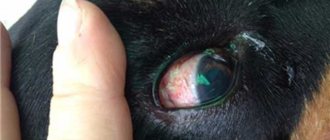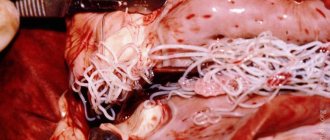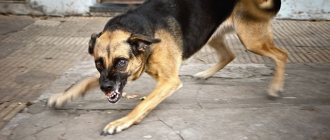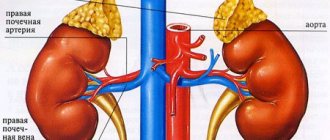Why do Pekingese eyes fall out?
Share this article
Each breed of dog has diseases that are specific to that breed. Pekingese have a special muzzle structure; due to the close and protruding location of the eyes, these cute animals suffer from prolapse of eyeballs. This pathology is often found in Pekingese and Japanese Chins. Owners of such dogs need to carefully monitor the health of their pet, especially the safety of the visual organs.
- Causes of pathology
- Symptoms
- How to help a Pekingese if his eyes are falling out?
- Disease prevention
Causes of eye injury in Pekingese
Why do Pekingese have problems with the visual organ? Due to the unusual structure of the skull, the muzzle of this dog breed appears deformed. A disproportionately small eye shape and a narrow muzzle increase the dog’s risk of injury. We can say that the Pekingese's eyeballs are held together only by their eyelids. Often these features lead to “loss” of the organs of vision. Also, the cause of eye loss in Pekingese is weakening of the eye muscles during periods of serious illness.
Note! Even dust, debris or a careless blow can lead to eye problems.
Of course, the organ of vision will not fall out completely and it is impossible to lose it. The eyelid pinches the eyeball and dislocation occurs. Not only Pekingese suffer from the disease, but also all dogs with a similar skull structure: pugs, French bulldogs, chins and others.
Eye diseases in Pekingese: conjunctivitis, cataracts, corneal erosion, distichiasis
Pekingese dogs have a small, strong body, thick hair, and a flat muzzle. Due to the unusual shape of the skull, the dog’s round eyes look extremely expressive. But at the same time, they are poorly protected and are susceptible to the development of various diseases.
The predisposition to ophthalmological problems in Pekingese is associated with the anatomical features of the skull. Therefore, before purchasing a puppy, bring a photo of the baby to the veterinarian. He will determine whether the dog suffers from entropion or incomplete closure of the eyelids. But even in these cases, simple plastic surgery and daily care will help the pet maintain its vision and remain healthy.
Conjunctivitis
The disease conjunctivitis can be suspected if the Pekingese has watery eyes, swelling, itching, photophobia, and pus. The cause of the disease is an infection that has reached the mucous membrane of the eyelid. Additional risk factors are weak immunity, lack of vitamin A, metabolic disorders, hypothermia.
Before going to the veterinarian, you need to relieve your pet's condition. To do this, soften the purulent crusts with Vaseline ointment. Remove accumulated exudate with a cloth moistened with chamomile infusion. After examination, the doctor will determine the type of disease and prescribe drops with an antibiotic and glucocorticoid substances.
Posted by Kennel (@kennel1965) Aug 15, 2021 at 1:35 PDT
Cataract
Clouding of the lens occurs due to age-related changes, trauma, chemical burns, and systemic diseases of the body. Without treatment, the disease can lead to the development of glaucoma and blindness. And slipped cataracts often block the natural flow of fluid inside the skull.
It is impossible to cure cataracts using a conservative method. Medicines only slow down the progression of the disease. To get rid of clouding, an operation is performed to remove the lens and replace it with an acrylic or plastic lens. Surgical procedures are not performed on older dogs with diabetes.
Corneal erosion
The cornea, or outer layer of the eye, has no blood vessels. Due to insufficient nutrition of the tissue and the bulging eyeball, it is exposed to adverse factors. Ingress of a foreign object, injury, or burns cause erosion. The disease is manifested by increased lacrimation, the appearance of suppuration, itching, and photophobia.
For treatment, the veterinarian examines the animal, removes the foreign object, and rinses the eye. Next, he prescribes antibacterial drops (Tsipromed, Tobrex) and corneal moisturizers (Oftagel, Oksial). The epithelium is restored in 5-15 days, depending on the area of damage.
Other diseases
In addition to entropion and non-closure of the eyelid, congenital pathologies include ectopic eyelashes and distichiasis. In these diseases, eyelashes grow critically close to the surface of the eyeball or have direct contact with the cornea. From a young age, dogs feel pain, itching, their tearfulness increases, and their eyelids become bright red. Diseases can only be treated surgically.
Acquired eye diseases in Pekingese often develop due to infection during walks. Purulent keratitis, conjunctivitis, blepharitis can be easily determined by the presence of exudate, photophobia, and nervous behavior. Such diseases can be treated at home. The main rule is not to skip procedures, to provide your dog with adequate nutrition and care.
How to care for Pekingese eyes
Since the eyes are the weak point of the Pekingese, they will need to be especially carefully looked after and cared for. The process of caring for your pet's visual organs includes the following:
- After each walk or active play, the dog's face will need to be examined for damage to the eyelids.
- The dog's eyes should be washed to remove dust and dirt 2-3 times a day.
- Redness in the area of the proteins signals the onset of an inflammatory process or even an infectious disease. In this case, the baby's owners need to contact a veterinarian.
The main thing in caring for the eye sockets of such a pet is timely care and accuracy.
The Pekingese muzzle has a specific structure
Diseases of the nose
A dog with shortened sinuses is unfortunately prone to nasal disease. The first problem that every Pekingese owner faces sooner or later is simple rhinitis or an infectious disease of the nasal sinuses. Externally, the disease manifests itself as a characteristic green discharge that has an unpleasant putrefactive odor. It is worth mentioning that the cause of rhinitis can be not only bacteria, but also a fungus, which will change the treatment of the disease. Depending on the nature of the causative agent of rhinitis, the Pekingese is prescribed an antibiotic or antifungal drug; this should be done by a veterinarian.
Symptoms of dropped eyes in dogs
Pekingese eye loss cannot be confused with any other ophthalmological disease. It seems that the eyeball has come out of its “socket”. Usually the white turns red due to protruding capillaries. However, there are also more serious dislocations of the eyes. Symptoms of severe visual displacement in dogs:
- Severe displacement of the white from the orbit.
- Lack of pupillary response to light stimulus.
- The pupil is unnaturally dilated.
- The white was filled with blood.
- An injured eye is softer to the touch than a healthy eye.
In the absence of proper treatment within three to four hours after the injury, the risk of removal of the dog’s organ of vision increases.
First aid for a fall
If a Pekingese's eye falls out, the minutes begin to count. The right decision would be to take your pet to a specialist veterinary clinic.
Walks with these kids should only take place in clearings with short grass.
The first aid for a prolapsed eyeball in a Pekingese is to protect the area from further damage. A clean piece of gauze must be moistened with saline solution and applied to the damaged area. The gauze must be secured with a bandage, tying it around the pet's head. It is also worth having a hard collar in the house so that he cannot scratch his fallen eye with his paw. The collar can also be made from thick cardboard.
Attention! To alleviate the dog's suffering, you can apply an ice pack to the back of the head and near the swollen area.
Cold will relieve pain in the short term.
After providing first aid to the dog, the owner needs to show the pet to a veterinarian within the first two hours.
Everything about Pekingese diseases, their symptoms and treatment
Pekingese are characterized as fairly healthy dogs .
Life expectancy is 14-16 years .
Some representatives of this breed live over 20 years .
Taking care of your Pekingese's health
With good care, staying healthy is easy. The owner must take preventive measures that are aimed at preventing infection with infectious diseases such as rabies, leptospirosis, canine distemper, and hepatitis.
Regular, timely vaccination will help avoid these dangerous diseases and keep your Pekingese healthy. Another important procedure is treatment against ticks, fleas and other insects.
Despite fairly good health, there are diseases caused by the physiological characteristics of this breed.
Daily eye care
Nature has adorned the Pekingese with large, slightly protruding eyes. Due to their flattened muzzle, they are constantly at risk, and therefore require special care and attention .
The eyes are inspected every day and wiped with a dry, soft, lint-free cloth . Healthy organs of vision look shiny, wide open, without cloudy spots.
The first warning signs are blue-gray cloudiness and red streaks in the eyeball. There is profuse lacrimation and frequent blinking. The injured organ of vision becomes inflamed, causing discomfort to the pet. Pay attention to the dog’s behavior: it rubs its head on some object, rubs its muzzle with its paw .
Pekingese eye diseases
The organs of vision are the most “sick” place of the Pekingese . They suffer from debris, hair, dust. During a walk, they are easily injured by prickly grass and protruding branches. Eyes can get sick due to drafts and infections.
Common diseases are:
- conjunctivitis,
- cataract,
- corneal erosion.
Incorrect treatment can lead to vision loss. It is difficult to diagnose the disease yourself, so treatment must be prescribed by a veterinarian.
To provide first aid you need to have eye drops. The choice of drugs for the organs of vision is quite large. The veterinary clinic will tell you what specific medications to use.
Congenital defects of the organs of vision ( double row of eyelashes, entropion of the eyelid) are eliminated surgically.
What to do if a Pekingese's eye "falls out"
Problems with the organs of vision arise, as a rule, as a result of injuries. Pekingese are bully by nature. The main cause of eye “loss” is fights with other dogs .
Experienced dog owners can insert the eyeball back on their own. To do this , open the eyelids wide and press on the eyeball with your fingers . The procedure must be carried out before the eyeball begins to swell.
It's best to consult a veterinarian. A sterile napkin moistened with saline is applied to the damaged organ of vision , and the dog is taken to the veterinarian. The sooner you arrive at the veterinary hospital, the greater the chance of saving your eye.
Important! To avoid eye injury, you should walk your pet on a leash, avoid contact with aggressive animals, and choose a place without large bushes and tall grass.
Spinal diseases
The relatively long and heavy body of the Pekingese creates a load on the spine and provokes diseases . If the dog does not want to play, behaves too calmly, and once again tries not to move, this indicates problems with the spine.
A common disease is displacement or destruction of intervertebral discs . It is believed that the disease is not associated with spinal injuries, but is hereditary. Still, do not allow your pet to go down the stairs on its own.
The disease is determined by the behavior of the Pekingese. When a dog is picked up, it squeals and tenses its abdominal muscles , trying to prevent movement in the spine. Therefore, the disease is mistaken for abdominal pain.
To ease your pet's suffering, try to limit its movements . Place him in a carrier so he can't move. They take the pet out of there just to relieve themselves.
A visit to a veterinary hospital is inevitable. After the examination, the veterinarian will prescribe treatment. Severe cases require surgery.
Heatstroke
The main decoration of the Pekingese is its long, luxurious coat with a thick undercoat. Because of this feature , they do not tolerate heat well and are often subject to heat stroke .
Rapid, heavy breathing indicates heatstroke. The correct temperature is maintained in the dog's room. This will keep your pet healthy and protect against heat stroke.
Important! Don't leave your pet in a locked car in the heat. Heatstroke can lead to death.
In case of heatstroke, the dog is moved to a cool place, the stomach is wiped with a cloth moistened with cold water.
Make sure the bowl always contains fresh water. Anyone who does not plan to participate in exhibitions can give their Pekingese a haircut .
Anal gland problems
A common cause of constipation in Pekingese is blockage of the anal glands . The glands are located near the anus.
If the dog tries to reach its butt with its teeth, moves its butt on the floor, or has difficulty emptying its bowels, then it’s time to clean the anal glands. The procedure is carried out in every veterinary hospital.
What to do if you have seizures
Cramps are involuntary muscle contractions and are accompanied by painful sensations.
Causes:
- a sharp decrease in blood sugar levels;
- liver damage;
- damage to the nervous system;
- cerebral circulatory disorders;
- lack of calcium;
- intoxication of the body.
During convulsions, remove objects that could injure the dog .
Cramps vary in duration, rate of contraction, and number of repetitions . Try to observe how long they last in your dog and which muscles tense:
- several seconds pass, all muscles contract, the pace of contractions is jerky;
- lasts several minutes, muscles contract slowly;
- repeated several times over a short period of time, contractions are frequent.
Notice if the dog loses consciousness . The recorded information will help the veterinarian determine the cause, establish the disease, and begin treatment.
Important! If seizures last more than 10 minutes or occur more than twice a day, contact your veterinarian immediately.
How to treat urethritis in Pekingese
Urethritis is a disease of the genitourinary organs, in which the urethra becomes inflamed, swelling of the mucous membrane occurs, which complicates the excretion of urine. The dog tries to go to the toilet and cannot. With urethritis, the temperature rises, thirst appears, and appetite disappears. Males are more often affected by this disease.
Causes:
- castration;
- infection;
- hypothermia (when lying on cold ground);
- urolithiasis disease.
The medications and treatment regimen for urethritis are determined at the veterinary hospital. If it is infectious, antibiotics are prescribed. If the cause is urolithiasis, then surgery to remove the stones is required. If there is a blockage in the urethra, your veterinarian will drain the urine through a catheter.
Tick bite
Ticks carry deadly diseases. The liver, spleen, kidneys, heart, and nervous system are affected. Because of the Pekingese's thick coat, it is difficult to detect these insects.
When a tick bites, the dog becomes lethargic within three hours, refuses food, and becomes nauseous . The pet's gait becomes uncertain, weakness of the hind limbs is observed, the temperature rises, the urine turns dark, and there may be an admixture of blood.
The tick must be found and removed, so examine your dog carefully. Head, ears, neck - these are the “favorite” places. The bite site is moistened with vegetable oil, wait 3-4 minutes, and twist the tick counterclockwise with tweezers.
If you have symptoms of illness, contact a veterinary hospital immediately! There they will prescribe treatment, give you an injection, and put on an IV.
Remember that determine the cause of your pet’s illness and prescribe treatment.
video about dislocation (loss) of the eyeball in a Pekingese:
Source: https://vashkinolog.com/porody/malenkie/pekines/zdorove-pek.html
What not to do if you have a dislocated eye
When an animal is injured, owners often lose self-control and try in every possible way to relieve the pain. Sometimes their “help” leads to irreversible consequences. What not to do if your Pekingese's eyes have fallen out:
- An injured eyeball should not be treated with peroxide, alcohol-containing or antiseptic substances. This can lead to burns and irritation of the injured area.
- It is not recommended to feed your dog before going to the veterinarian, as doctors may administer anesthesia to the pet.
- It is unacceptable to give your pet painkillers.
- Use cotton wool or cotton pads. Pieces of tissue can get into the eye and cause inflammation.
Note! Forcing a dog to eat a painkiller pill will only make things worse.
The threshold for feeling pain in dogs is much lower than in people, and under the influence of drugs, the veterinarian will not always be able to determine the presence of complications from the dog’s reaction.
How to straighten a dog's eyes
If a Pekingese's eyeball falls out, it is necessary to act immediately. It is important that veterinary care should be provided to the dog within the first two hours. In the following hours, the percentage of chance of maintaining vision decreases, as the eyeball begins to dry out.
Doctors usually fix the dog's eye in just a few minutes by pressing on it. Only from the outside, the operation seems simple; in fact, the main task is not to damage the organ of vision and avoid possible complications.
Pekingese should not be left unattended with children.
In severe cases, veterinarians put the dog under anesthesia, clean the eyelid and eye socket with special solutions, administer an antibiotic and reset the organ of vision. Sutures are placed on the damaged area, and part of the dog's head is tied with a bandage to fix it.
If the operation went well and the threat of losing the eye has passed, after about two weeks the sutures are removed and the dog undergoes a course of antimicrobial and anti-inflammatory treatment. Tablets or injections will help avoid complications after surgery.
Additional Information! On the Internet you can find tips on how to set a prolapsed organ of vision in a Pekingese yourself. You should not experiment with your pet's health.
If treated incorrectly, the risk of vision loss increases significantly. Also, if you solve the problem yourself, you can introduce an infection into the dog’s body.
Possible complications
Lack of proper treatment for eye injuries in Pekingese often leads to serious consequences:
- Strabismus.
- Weakening of visual functions.
- Blindness (total or partial).
- Loss of an eye.
- Corneal ulcers due to drying of the eye socket.
To avoid such complications, if the dog is injured, it is necessary to show it to a veterinarian within the first hours. Only a doctor can prevent the development of serious complications. If your Pekingese's eyeball falls out, there is no need to panic. The dog needs to be taken to a veterinary clinic.
The sooner the dog is taken to the doctor, the greater the chance of avoiding complications.
Preventing eye loss in Pekingese
Constant monitoring of the dog's health will help prevent the eyes from falling out of the socket. Daily examination of the visual organs and washing them with a special solution is only a small part of what the owner needs to do to maintain the health of the dog. Prevention of eye loss in Pekingese includes:
- Limiting active games with other dogs that can cause injury to the pet.
- Careful interaction of the Pekingese with small children who can put pressure on the dog's eye.
- Frequent visits to the veterinarian for preventive examination.
- Walk only in open areas where there is no tall grass or bushes.
- Careful handling of the Pekingese. No high jumps, tosses or hits to the back of the head.
- Do not tighten the collar on your Pekingese's neck or pull the leash too hard.
- Maintaining a healthy lifestyle for your dog: proper nutrition, taking vitamins and minerals as needed, and routine visits to the veterinarian.
The most effective prevention of eyeball loss in Pekingese is surgery. This measure is necessary only in cases where loss occurs frequently. During eyelid surgery, incisions are made in the dog's eye area. This causes the dog's eyelids to close more.
Important! Surgery does not guarantee complete relief from eyeball loss, but it will significantly reduce their frequency.
Prevention and care
When purchasing a Pekingese puppy, remember that this fragile creature requires careful care. Its owner must show attention and care for his pet, especially monitoring the condition of the eyes. The following safety precautions will help you avoid injuries and stressful situations:
- Don't hit the dog.
- If possible, keep the animal away from small children who cannot control their movements and large aggressive dogs.
- Do not allow your Pekingese to jump from a chair or sofa or make other sudden movements.
- Do not allow your pet to participate in “dog fighting”.
- Check your dog's eyes every day for redness or discharge.
- Wipe your pet's eyes with a special solution.
And most importantly, do not put off visiting a doctor; at the first sign, contact your veterinarian.
Recommendations and advice for future Pekingese owners
Some potential Pekingese breeders are frightened by the prospects of developing problems with breathing and loss of vision. Due to the unusual structure of the skull, the problem with difficult breathing of Pekingese, unfortunately, cannot be solved, but you can reduce the likelihood of eye loss by choosing the right dog.
Some representatives of the breed have the correct eye structure, and this significantly reduces the risk of loss. When choosing a dog, you need to make sure that the eyes are not “bulging” and do not protrude too much from their sockets.
Additional Information! You can choose a healthy purebred Pekingese only in specialized shelters and from prof. breeders.
By buying a pet at markets or secondhand, future owners may become owners of dogs with serious diseases, including those that cause their eyes to fall out.
Communication with other animals should not cause injury
Owners need to remember that Pekingese dogs have eyes that fall out. With correct first aid, a dislocated eye can be treated. Constant monitoring of your pet’s behavior and daily care for its health will help you avoid injury.
Problems with stool
Pekingese dogs often have problems with stool; let’s look at all the causes and treatment of constipation and diarrhea in more detail.
Constipation in Pekingese
The cause of the disease in Pekingese can be the presence of a foreign body in the intestines, a too narrow anus, or errors in nutrition. If we talk about more serious diseases, a symptom of which constipation may be, these may be:
- Oncology
- Poisoning from chemicals or drugs
- Intestinal obstruction and so on
How to help your Pekingese? The first aid that can be provided at home is a cleansing enema, the simplest treatment option. If the desired effect does not appear, you should try using one of the products that have a laxative effect. These can be: herbal preparations, oil preparations or pharmaceutical preparations.
If during observation it becomes clear that the cause of constipation is probably a spasm of smooth muscles, it is worth giving the Pekingese antispasmodic drugs - no-shpu or drugs with a similar effect.











